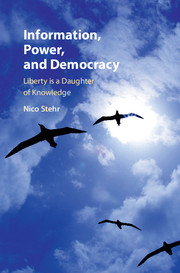Book contents
- Frontmatter
- Contents
- List of figures
- List of tables
- Introduction
- 1 Coming to terms
- Excursus: How much knowledge does democracy need, and how expensive should it be?
- 2 Accounts of the conditions for the possibility and the resilience of liberty
- 3 The economic order ensures (defeats) liberty
- 4 Scientia est libertas
- Excursus: An inconvenient democracy: knowledge and climate change
- Knowledge and democracy: summary and conclusions
- Bibliography
- Index
2 - Accounts of the conditions for the possibility and the resilience of liberty
from Excursus: How much knowledge does democracy need, and how expensive should it be?
Published online by Cambridge University Press: 05 December 2015
- Frontmatter
- Contents
- List of figures
- List of tables
- Introduction
- 1 Coming to terms
- Excursus: How much knowledge does democracy need, and how expensive should it be?
- 2 Accounts of the conditions for the possibility and the resilience of liberty
- 3 The economic order ensures (defeats) liberty
- 4 Scientia est libertas
- Excursus: An inconvenient democracy: knowledge and climate change
- Knowledge and democracy: summary and conclusions
- Bibliography
- Index
Summary
Man can know: thus he can be free.
Karl Popper ([1960] 1968:6)Liberties evolve on the basis of particular social forces; the survival of liberties may depend on other social forces, if not the same forces. But in some countries, even the highest virtues may not ensure that democratic institutions endure. In any case, there is quite a large and vibrant collection of competing hypotheses referring to distinctive requisites and conditions that make the development, intensification, and persistence of democratic political systems possible. Social theories and ideas developed to account for the origins, the legitimacy, the stabilization, the distribution across the globe, and the sustainability of democracies are of considerable value, not only within social science disciplines, but also especially as ideas (for example, “democracy is a desirable form of governance”) in the world of politics, since they always include practical advice on how to advance the process of democratization.
I will enumerate and discuss only a few, if the most central, of these rival theses. Among the societal processes that are seen to be most likely responsible for the emergence and enforcement of democratic regimes are references, often rather ambivalently formulated, to socioeconomic and sociopolitical imperatives or values; that is, to factors and forces internal or external to the political system (see Rustow, 1970) which enforce a definite path on history. Francis Fukuyama, for example, explains his famous and controversial thesis of the end of competing ideologies toward the end of the twentieth century in the wake of the so-called “third-wave” of democratization (Huntington, 1991; Shin, 1994) by stressing that “there are fundamental economic and political imperatives pushing history in one direction, towards greater democracy” (see also Fukuyama, 2014). But as the official justification for the Iraq war in 2003 demonstrates, United States government officials have indeed expected to see democracy emerge from the barrels of guns, perhaps mimicking Mao Zedongs's famous aphorism that political power at least “grows out of the barrel of a gun.”
- Type
- Chapter
- Information
- Information, Power, and DemocracyLiberty is a Daughter of Knowledge, pp. 82 - 128Publisher: Cambridge University PressPrint publication year: 2015



